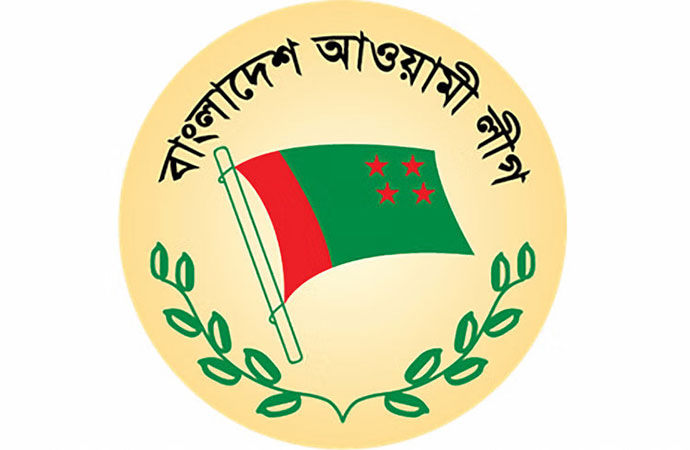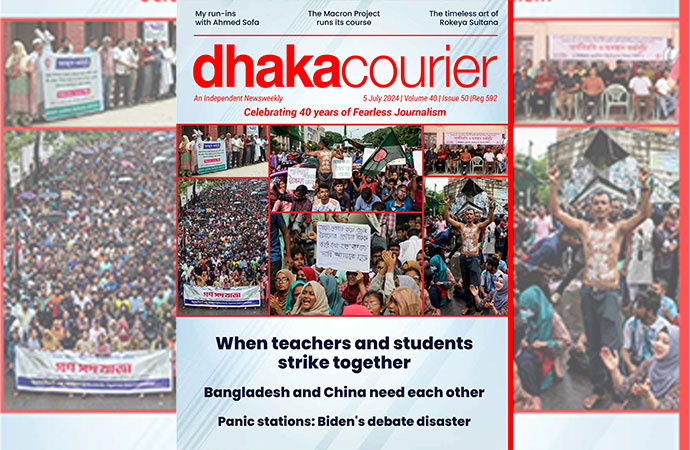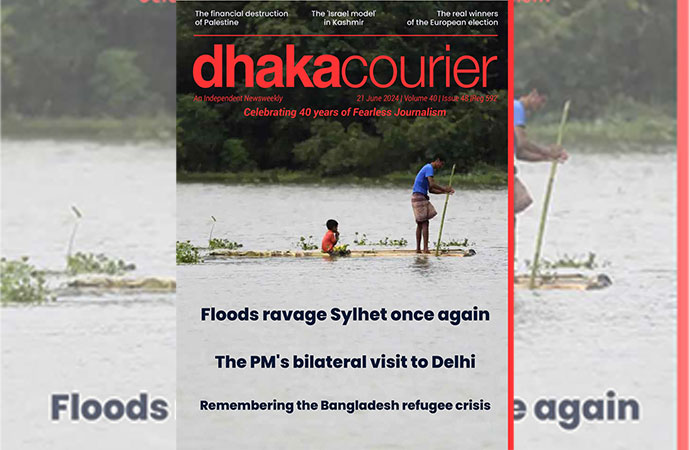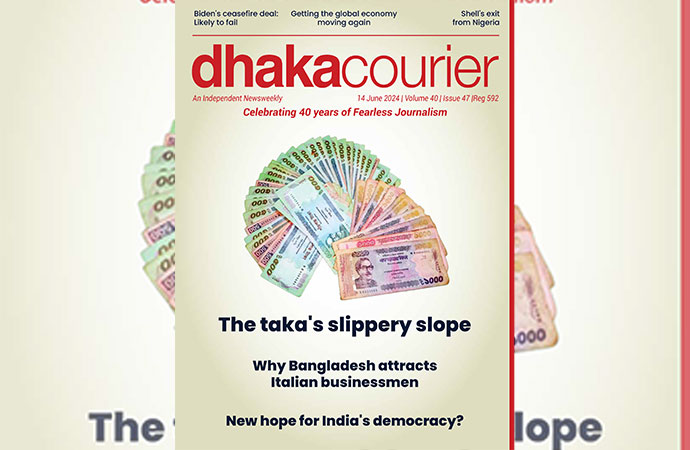Reportage

Rohingya children get a huge playground at Bhasan Char
The Rohingyas, now living in Bhasan Char, want to see a peaceful environment in Myanmar with the restoration of their basic rights for their early return despite what they say having a far better place than the congested camps in Cox's Bazar.
"We're living here (Bhasan Char) happily and peacefully. We're very happy with the facilities we've got here. But we want to return to Myanmar," Fayez, a 28-year-old Rohingya man, told Dhaka Courier.
He said he has just opened a shop in Bhasan Char that offers tea and snacks and is hopeful of earning a little bit of money through the daily sales.
Fayez is one of the over 8,000 Rohingyas who willingly have shifted to Bhasan Char in search of a better place, including safety and security.
"I'm here with my wife, three children and my mother-in-law," said the young Rohingya man who entered Bangladesh in 2017 amid military crackdowns in Rakhine State.
He said they are receiving 10 kilograms of rice per head every month apart from potatoes, sugar, edible oil, salt and other essentials.
The numerous challenges associated with the temporary hosting of persecuted Rohingyas from Myanmar have compelled the government of Bangladesh to plan the relocation of 100,000 Rohingyas to Bhasan Char, Bangladesh says.
Accordingly, 1642 Rohingyas were relocated to Bhasan Char on December 4 and the second batch, comprising 1804 Rohingyas, had been transferred from Cox's Bazar to Bhasan Char on December 29 last year.
"We're, in fact, waiting to return to our own place in Myanmar. We seek justice. We want to get back our basic rights that we deserve. We're ready to return home but we're living in Bhasan Char happily so far as we spent two months here," said Rafikul, another Rohingya man standing in front of a big playground made for kids.
He said those who are being arrested in Myanmar should be released to restore peace in his homeland as their target is to return to home with all their rights back in place.
Rafikul's parents and sisters are still in Cox's Bazar camp as they want to take more time to decide while the number of interested Rohingyas to come to Bhasan Char is growing.
"The number of children among those who are already here in Bhasan Char is high, especially the four-fourteen year age group. Probably, Rohingyas in Cox's Bazar camps got the information about infrastructure, facilities for informal education and other issues that encouraged them to come here," Commodore Abdullah Al Mamun Chowdhury, project director of the Ashrayan-3 Project (Bhasan Char project), told Dhaka Courier during at Bhasan Char recently.
Referring to his discussions with the Refugee, Relief and Repatriation Commissioner, he said there are more Rohingyas who are willing to come.
Responding to a question, Commodore Mamun said there were initially 22 NGOs but currently over 40 are operating in Bhasan Char.
Talking to Dhaka Courier, Amena Khatun, a ten-year-old girl, said she came with her parents and she has two sisters and three brothers who are all in Bhasan Char.
"I'm running a small betel leaf shop. My sales volume is more or less Tk 200-300. It gives me a tiny income every day," she said adding that they are waiting to return to their home in Rakhine.
During the visit, Rohingya children were seen playing in big numbers in an adjacent playground and mini-children park.
For Bhasan Char, the government says, much better infrastructures have been put in place involving renowned international companies.
The British firm HR Wallingford was involved in the stability survey of the island. In fact, the island was developed as per their recommendation and design.
The flood and shore protection measures with a 12.1-km long and sufficiently higher embankment, designed by the HR Wallingford, secures the island from massive tidal waves and cyclones, according to the Ministry of Foreign Affairs (MoFA).
This is supplemented by the installation of modern hydrographic monitoring and warning systems that can provide early warning on any natural hazards and enable prior evacuation, officials said.
The efficacy and strength of the infrastructures of Bhasan Char and its disaster protection measures have been tested during the deadly cyclone AMPHAN, the MoFA says.
To address any extreme situation, there are arrangements for evacuation in a timely manner as per the government's disaster response management framework.
Economic Activities
The Rohingyas, now living in Bhasan Char, are gradually getting involved in economic activities and informal education which, the authorities say, will help Rohingyas stay away from committing any major crimes.
Bangladesh Rural Development Board (BRDB) and over 40 non-government organisations (NGOs) are now working in Bhasan Char helping the Rohingyas get motivational courses and hands-on training on agriculture, fish cultivation, sewing skills and poultry rearing.
During a recent visit, a good number of Rohingyas - both men and women - were seen running shops in Bhasan Char in an effort to earn money in addition to the supports they receive.
"Rohingays will stay away from committing major crimes if they become committed to agriculture, fish cultivation, sewing and poultry rearing and get involved in other economic activities," Commodore Abdullah Al Mamun Chowdhury, project director of the Ashrayan-3 Project (Bhasan Char project), told Dhaka Courier.
Though some pilot projects are currently in place, the NGOs are submitting concrete projects, and they will be in a better position by the next one month, he said.
The Rohingya camps in Cox's Bazar witnessed a number of killings over establishing supremacy among various groups.
While visiting a training centre in Bhasan Char, BRDB Joint Director Sukumar Chandra Das said they have so far provided training to 750 Rohingyas in a number of areas.
Fish cultivation, poultry, sewing machine operation, agriculture, vegetable production, handicrafts and farming are among the areas of interest.
Sukumar Chandra said it is under consideration to take projects involving trained Rohingyas in productive activities.
Kay Kraft, fashion house, is providing training to Rohingya women in Bhasan Char to get them involved in productive economic activities.
Kay Kraft is initially providing training to 150 Rohingya women for three months on cutting, sewing, printing, design, block printing and machine embroidery.
Talking to Dhaka Courier, a Rohingya female trainee at BRDB training class said they are undergoing a five-day basic training on sewing. "It's our fourth day. We're 40 women here. We didn't have this opportunity at Cox's Bazar camp."
She said they will use the clothes initially for their family members and they will sell once they become fully skilled to produce quality products. "If we can earn a little bit of money, it'll be good for us."
Commodore Mamun said the Rohingyas will not face any embargo while getting involved in economic activities as there is no host community in Bhasan Char.
The biggest concern that he saw among the Rohingyas is the future of their children. Commodore Mamun said children are getting informal education in Bhasan Char.
Abdullah Al Mamun, Community Engagement Officer at Alliance for Cooperative and Legal Aid Bangladesh (ACLAB), told UNB that they are providing informal education to Rohingya children in English and Burmese language in two shifts - morning and afternoon.
"Primarily, we're spending money from our own funds. We're expecting funding soon," he said standing beside the learning centre.
Commodore Mamun said the Rohingyas are willing to return to their homes in Myanmar safely but until now they are living here comfortably.
Physical Arrangement
Bangladesh and Myanmar signed the repatriation deal on November 23, 2017. On January 16, 2018, Bangladesh and Myanmar signed a document on 'Physical Arrangement', which was supposed to facilitate the return of Rohingyas to their homeland.
Bangladesh says the Rohingyas do not trust their government, and Bangladesh gave a number of proposals to build trust among them.
Bangladesh is trying in multiple ways -- bilaterally, multilaterally, tri-laterally and through the judicial system -- to find a lasting solution to the Rohingya crisis.
Bangladesh proposed deployment of nonmilitary civilian observers from Myanmar's friendly countries -- Japan, China, Russia, India and Asean countries.

























Leave a Comment
Recent Posts
How China's reform benefit the ...
"It's very clear that China has entered a new era under Presi ...
How do we heal?
After the unprecedented violence of the past two weeks, the most impor ...
The High Court fixed July 25 for delivering verdicts
Biden’s legacy: Far-reaching accomplishments that di ..
US President Joe Biden dropped out of the 2024 race
“A kiss over bribe”: Nachiketa’s social message to D ..